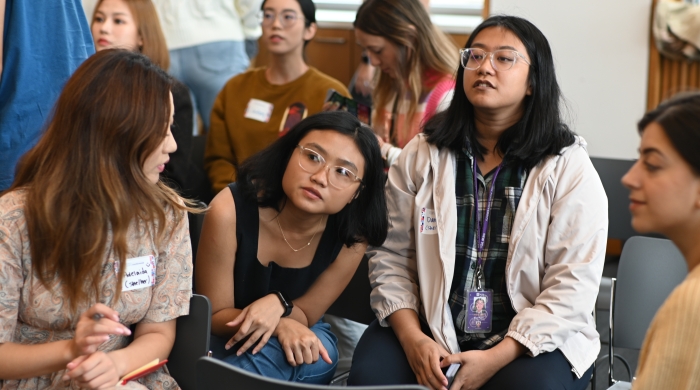
Still Accepting Applications
An optional specialization in the MA in Learning Technology and Experience Design (LTXD) allows students to customize their degree to align with their personal and professional goals. To obtain a specialization, students must complete three related electives, which may include an internship aligned with your specialization. Specialization electives can be selected in consultation with your advisor, and/or from the pre-defined specializations below.
User Experience Design (UXD)
Master methods, tools, and skills for designing learner-centered experiences and products, including how to research learner needs, ideate and evaluate designs, and convey your ideas persuasively to collaborators and stakeholders. The design thinking and communication skills developed through this specialization are widely applicable to fields within and beyond educational technology.
Courses that count toward this specialization:
- User Research Methods
- EdTech UX Studio: Design for a Client
- Tangible Electronics for Teaching and Learning
- Experience Design and Artificial Intelligence
Artificial Intelligence and Education (AI-Ed)
Build a theoretical and technological foundation in artificial intelligence and its applications in education. Learn to design, develop, and evaluate AI applications that augment teaching and learning, such as through adaptation, personalization, feedback, and creativity support. Become fluent in issues surrounding the responsible, ethical, and critical uses of AI and its impact on human performance and society.
Courses that count toward this specialization:
- Building Artificial Intelligence Applications for Education
- Learning Experience Design and Artificial Intelligence
- Next-Gen Design: Crafting AI-Driven Products
- The Future of UX and AI
- Machine Learning
- Big Data
- Introduction to Computer Vision
- Interpretability & Causality of Language Models
- Deep Learning for Media
- Machine Translation & Post-Editing
Games for Learning (G4L)
Learn to create and evaluate game-based learning experiences that build on people’s propensity for play. Develop an understanding of how the cultural, emotional, cognitive, and social dimensions of games can enhance learning. Gain skills in prototyping, playtesting, and evaluating learning outcomes from games across digital and in-person contexts.
Courses that count toward this specialization:
- Designing Simulations and Games for Learning
- Games and Play in Education
- User Research Methods
- Narrative, Digital Media, and Learning
Research
Investigate contemporary issues in education using foundational theories and methods from cognitive science and the learning sciences. Develop skills in selecting appropriate research methods, critically evaluating existing research, and translating findings into practical insights for designers, academics, and stakeholders in education.
Courses that count toward this specialization:
- User Research Methods
- Quantitative Research Methods
- Qualitative Research Methods
- Interview and Observation
- Survey Research Methods
- Basic Statistics
- Educational Data Science




